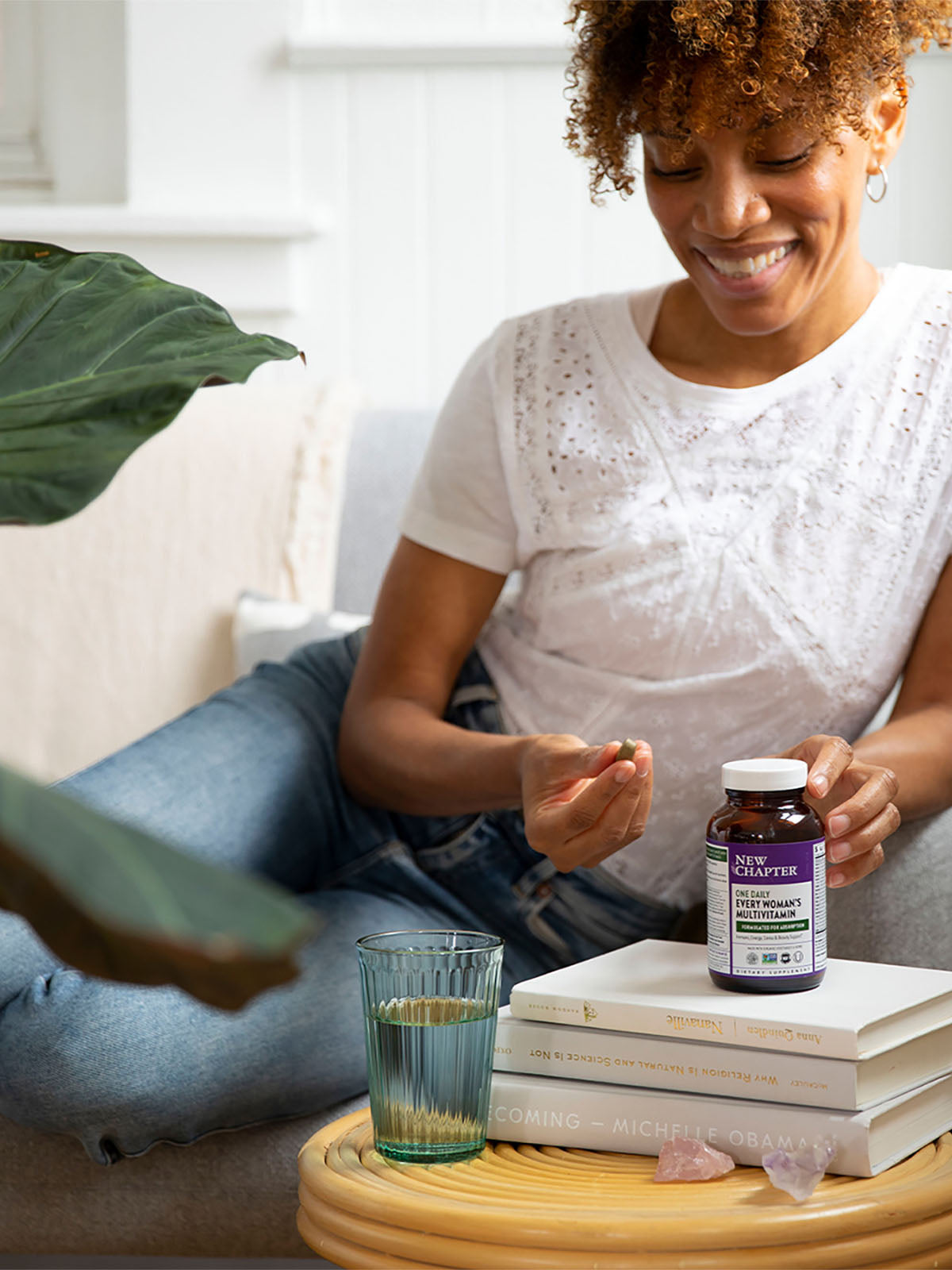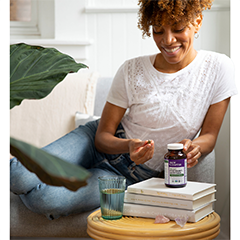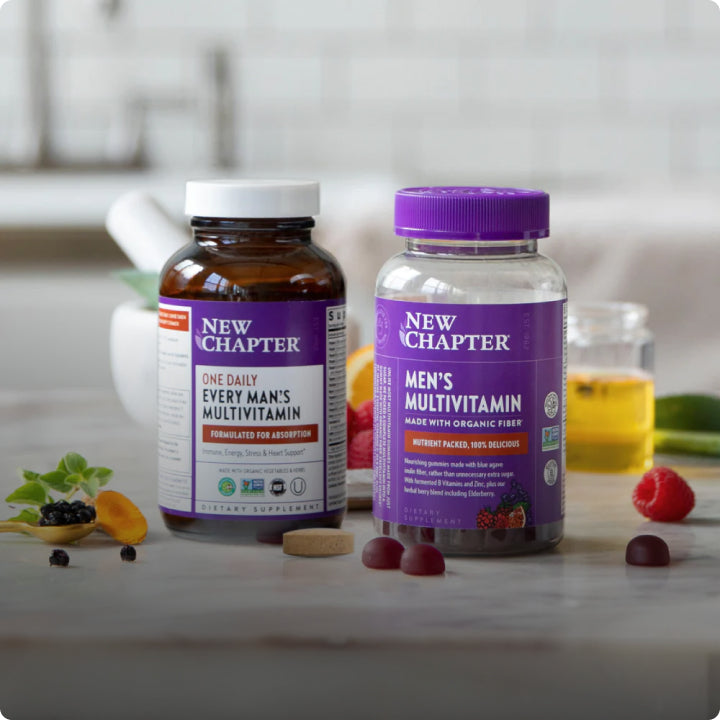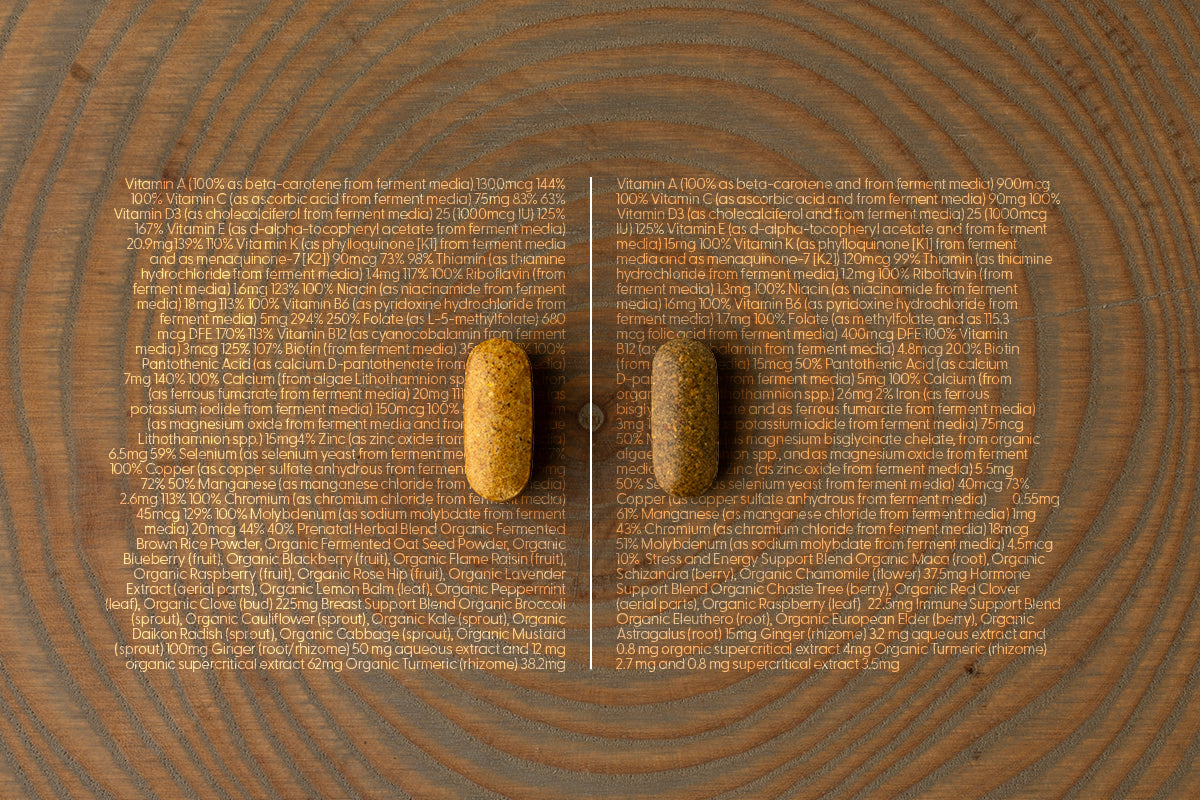Vitamin D is a critical nutrient for bone health benefits. You need Vitamin D every day! Vitamin D is necessary to help your body with calcium absorption. Vitamin D also helps prevent bone diseases like osteoporosis (weak bones). Read on for the New Chapter® guide to all things D, especially the importance of a fermented D3 supplement with superfood herbs. We’ll review its benefits, common sources, and what to look for in your Vitamin D supplements.
What is Vitamin D?
First, what exactly is Vitamin D? Also called calciferol, Vitamin D is a hormone and fat-soluble vitamin. It keeps your body healthy by helping with calcium absorption. Vitamin D is naturally generated in the body when sunlight meets the skin. You can also get Vitamin D in some foods and from supplements.
There are multiple forms of Vitamin D, including Vitamin D2 (ergocalciferol) and Vitamin D3 (cholecalciferol). Vitamin D2 comes from plants and is commonly used to fortify foods. Vitamin D3 is the form of Vitamin D naturally produced in the body. Although both D2 and D3 increase the overall amount of Vitamin D in your blood, if you're looking for the best form of Vitamin D, Vitamin D3 may be the more potent option.
Benefits of Organic Vitamin D3
The important health benefits of Vitamin D range from bone strength to cardiovascular health to immune support.*
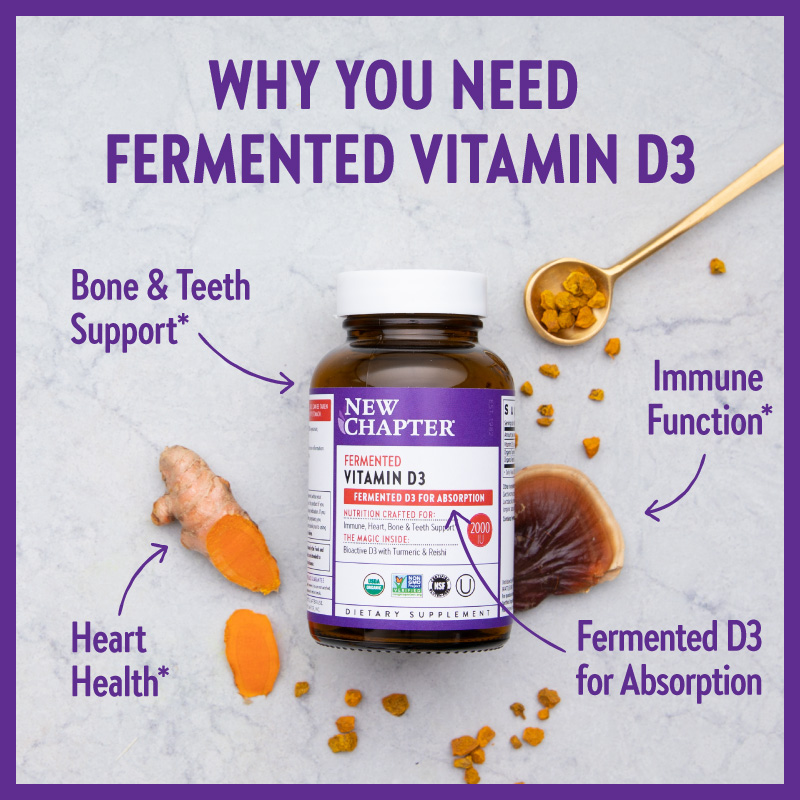
Bone Strength
Calcium keeps your bones strong and healthy. But calcium needs help to do its job—in the form of Vitamin D. D helps bones absorb calcium properly. It supports normal bone creation and density.* Vitamin D3 is the most effective form of Vitamin D for calcium absorption from the bloodstream. You could think of calcium as the bricks and D3 as the mortar that together support your skeletal system. And did you know that starting in your mid-30s, you begin to lose bone density every year? That’s why bone-strengthening formulas containing Vitamin D3 can be so important in your daily regimen!
Heart Health
Emerging studies suggest that Vitamin D benefits cardiovascular health and healthy blood pressure.* When calcium in your bloodstream gets absorbed with the help of D3, that in turn supports heart function and helps maintains artery health.* The American Heart Association notes that consuming enough D to support strong bones can also help support heart health.
Immune Support
Other benefits of taking Vitamin D3 include immune support.* Maintaining sufficient Vitamin D helps support the body's healthy immune response. If you’re looking for an immune boost due to time of year or travel plans, consider adding an organic Vitamin D3 supplement to your immunity regimen.
Sources of Vitamin D3
So, you might be saying, “I know that Vitamin D3 is important, but where do I get it? What are some foods high in Vitamin D?” Fortunately, there are a variety of options for getting your daily dose of Vitamin D for bones.
Fortified Foods
One way to get enough Vitamin D is with fortified foods. These tend to be beverages. Fortified orange juice and milks (including cow’s milk, oat milk, almond milk, and soy milk) can provide around 15% Daily Value of Vitamin D per cup. Be sure to read the nutrition facts label on your juice or milk to confirm that is has added Vitamin D. Keep in mind that juice and milk alone do not have enough Vitamin D3 to meet your daily requirements.
Fish and Fish Oils
The best food sources of Vitamin D3 are fatty fish (like mackerel, tuna, and salmon). This is because fatty fish naturally produce bioavailable Vitamin D3 in their bodies. New Chapter’s Wholemega™ wild Alaskan salmon oil gets its heart-healthy D3 naturally from sustainably harvested wild salmon. According to a study conducted by the National Institutes of Health, wild-caught salmon can have anywhere from 600-1000 IU of Vitamin D per 3.5 oz. That’s 4 times the Vitamin D of farmed salmon!
The Sunshine Vitamin
You have probably heard that you can get Vitamin D from the sun! This is true, but to varying degrees. The UV rays from the sun, specifically UVB, can promote natural Vitamin D production in the body. Most people get at least some Vitamin D this way. However, there are some factors that might affect your ability to get Vitamin D from your afternoon walk.
How Much Vitamin D Per Day is Recommended?
The recommendation for daily Vitamin D intake varies by age. The older you get, the more Vitamin D you need! According to the National Institutes of Health, the average adult (age 19-70) should consume 15 micrograms (or 600 IU) of Vitamin D daily. Pregnant and breastfeeding women need this amount as well. However, the Vitamin D recommendations go up for adults over the age of 70.
| Recommended Daily Vitamin D Intake by Age | Vitamin D dosage in micrograms (mcg) | Vitamin D dosage in International Units (IU) |
| 19-70 years old | 15 mcg | 600 IU |
| 71+ years old | 20 mcg | 800 IU |
| Pregnant & Breastfeeding Teens and Adults | 15 mcg | 600 IU |
Why two measurements? Micrograms are a measurement of weight. International Units are based on substance potency and are often related to medications, vaccines, and some vitamins. Companies are required to list weight (mcg) on packaging, and some companies (including New Chapter) also choose to list IUs to provide more information.
Signs of a Vitamin D Deficiency
Many people don’t track their daily Vitamin D intake. If you are not getting enough D in your diet, you could develop a Vitamin D deficiency. According to the Cleveland Clinic, symptoms of Vitamin D deficiency include muscle weakness and fatigue. Vitamin D deficiency is somewhat common in the US. Nearly one out of four people have Vitamin D blood levels that are considered too low.
Habits and Conditions that Reduce Absorption of Vitamin D
Some habits and conditions can reduce your absorption of Vitamin D and increase risk of Vitamin D deficiency. Conditions such as age, weight, and skin tone, and habits such as sunblock use, can affect the creation and absorption of Vitamin D in the blood. For example, as we age, our bodies become less effective at converting UVB into Vitamin D in the skin. This is why it's extra important to ensure you're obtaining Vitamin D in your diet as you age!
When it comes to Vitamin D, sun exposure versus skin care can cause a dilemma for many people. Using sunblock can significantly affect your ability to synthesize your own Vitamin D. Overexposure to UV rays can cause serious conditions such as skin cancer, which is why doctors and dermatologists typically recommend protecting the skin when going out in the sun. For example, the American Academy of Dermatology recommends wearing broad-spectrum sunscreen with an SPF (sun protection factor) of 30 or higher. However, wearing SPF blocks UVB rays and could affect your chances of producing Vitamin D. If you’re concerned about the blocking effects of sunscreen, you can always rely more on foods and supplements that provide Vitamin D.
How to Get More Vitamin D in Your Diet
If it feels difficult to get the best Vitamin D for bone health, organic D3 supplements can help! Choosing vitamin D supplements gives you a measured amount every day. They make it easier to track your Vitamin D intake and prevent a deficiency. Look for organic Vitamin D3 to support effective calcium absorption. Check the Supplement Facts Panel for information on the % Daily Value of Vitamin D in that product.
How much vitamin D is too much? According to the Mayo Clinic, 4000 IU of Vitamin D daily is the tolerable upper limit of safety. If you consume more than 4000 IU of Vitamin D every day, you could experience Vitamin D toxicity, leading to symptoms such as nausea and vomiting, constipation, confusion, and kidney damage. Basically, there is no need to take megadoses of Vitamin D!
Fermented Organic Vitamin D Supplements
New Chapter delivers nutrition with uncompromising commitment to quality and sustainability. When it comes to getting more Vitamin D in your day, there are several New Chapter Vitamin D options.
Organic D3 Supplements
A reliable supplement rich in organic D3 can be a great way to fill nutritional gaps. New Chapter’s one-daily Fermented Vitamin D3 is formulated for absorption so you can get the most out of each tablet. We include complementary superfoods Turmeric and Reishi. Our certified organic Vitamin D3 is gentle even on an empty stomach! Don't want to take D3 in a pill? Turn to our 100% delicious Vitamin D3+ gummies, packed with 1000 IU D3 per 1 gummy serving (and less than 1 g sugar)!
Plant Calcium
You don’t have to take a Vitamin D supplement to get more D3 in your diet! Bone-strengthening supplements such as Bone Strength Take Care™ can provide both the calcium and D3 you need to stay healthy and active. Bone Strength Take Care is formulated with an exclusive blend of Vitamins K2 and D3 designed to help your body absorb calcium properly.* (Vitamin K2 helps direct calcium into your bones, where you need it.) Choose easy-to-swallow slim tablets or even smaller Tiny Tabs™.
Multivitamins
Our daily multivitamins are made with essential nutrients that your body can recognize. We craft each blend with select fermented vitamins and minerals, including high quality Vitamins A, C, D3, and Zinc. We also add complementary botanicals, like organic Turmeric. Together, these blends give you immune, cellular energy, stress, beauty, and digestion support, as well as heart, brain, and bone health support.* They’re gentle enough to take anytime, even on an empty stomach!
Just as Vitamin D supports strong bones, New Chapter supports your ongoing wellness journey. Whatever your health needs, we’ve got your back.

